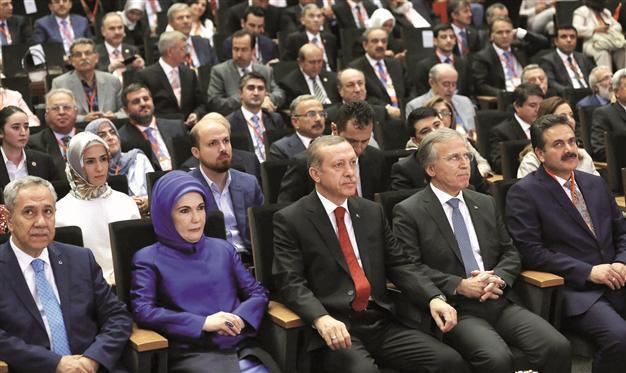‘No double-headed AKP’ in post-Erdoğan era
Nuray BABACAN ANKARA
 Turkish Prime Minister Recep Tayyip Erdoğan has instructed his party’s leaders to avoid “double-headed management” if he is elected president in August’s elections, Justice and Development Party (AKP) sources have told daily Hürriyet.
Turkish Prime Minister Recep Tayyip Erdoğan has instructed his party’s leaders to avoid “double-headed management” if he is elected president in August’s elections, Justice and Development Party (AKP) sources have told daily Hürriyet.Erdoğan’s presidential candidacy was announced by the AKP at a ceremony in Ankara that was attended by 4,000 supporters on July 1. The Turkish PM made clear in his speech that he wanted to be elected president in the first round of the Aug. 10 elections in which a vote of 50 percent plus one is needed.
Following the official announcement, Erdoğan first met with his aides and then the provincial heads of his party to discuss what is being dubbed “the second-phase plan.”
“It will be regarded as treason to suggest names for the post of prime minister before the president is elected. There won’t be a double-headed management in the party,” Erdoğan told his party officials, according to sources in the AKP.
Erdoğan also stressed that “the three-term rule” would be maintained. As a consequence, the candidates for the Prime Ministry in the post-Erdoğan AKP are being re-evaluated in the light of Erdoğan’s latest position.
In the backstage of the ruling party, President Abdullah Gül remains the most popular figure for the position of prime minister under the possible presidency of Erdoğan. However, Erdoğan’s ruling out of midterm elections means Gül, who will leave the presidency next month, cannot be elected to Parliament before the June 2015 general elections, which means that he cannot take up the Prime Ministry post even if he wished to do so.
Those who support the formula suggest that former Transport Minister Binali Yıldırım could be a “transitional prime minister” until Gül takes the post in the June 2015 elections. Yıldırım is also a popular figure among AKP deputies.
Gül had said in April that he had no political plans for the future under the given conditions, which was widely interpreted as meaning that he did not want to become a “puppet” prime minister under Erdoğan’s presidency.
Another PM candidate for the post-Erdoğan AKP is Foreign Minister Ahmet Davutoğlu, although he is not a popular figure among the founders and leaders of the AKP. However, the party’s new leader, hence the PM, will be elected by its 1,300 delegates, and not its 313 deputies. The key question is whom Erdoğan will select.
The AKP’s highest decision-making body, the Central Decision and Executive Board (MKYK), is expected to convene in early September and elect the new party chairman to prepare for the party congress. Sources say this name could be the AKP’s deputy head, Mehmet Ali Şahin.
If elected president, Erdoğan will name someone on Aug. 29 to form a new government. The AKP congress is expected to convene on Sept. 13-14 to elect a new chairman.
Erdoğan does not want any name to be announced before Aug. 28, the date that Turkey’s new president will take the oath, to avoid what happened to the Motherland Party (ANAP) after then-Prime Minister Turgut Özal was elected as the country’s eighth President in 1989.
An irreversible decline in the powerful center-right party started after Özal decided to leave the Prime Ministry for the presidency. Eighteen names were debated as ANAP’s possible leader in the post-Özal era, which led to a schism in the party.
Erdoğan’s presidential campaign will be based on his election tour which will include 30 provinces in Turkey’s largest cities. Ministers and other party officials will conduct the campaign in other provinces.
Meanwhile, Numan Kurtulmuş, deputy head of the AKP, ruled out on July 2 that Erdoğan would resign from the Prime Ministry for the moment. “There is no legal obstacle for him to continue on as our chairman and prime minister” during the presidential campaign, Kurtulmuş said.
Erdoğan’s competitors in the presidential race are Ekmeleddin İhsanoğlu, a non-partisan academic supported by two opposition parties – namely the social democratic Republican People’s Party (CHP) and the Nationalist Movement Party (MHP) – and Selahattin Demirtaş, the co-leader of the Peoples’ Democracy Party (HDP), which is focused on the Kurdish problem.
















